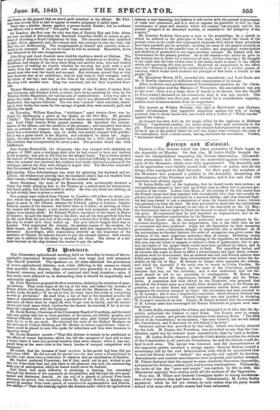fEbe larobintes.
The Gloucester agricultural meeting, held on Saturday in terms of the re- markable requisition formerly mentioned, was large and well attended. The Sheriff presided. The speakers on all sides admitted the prevalence of severe agricultural distress; and, while differing in the causes to which they ascribed this distress, they concurred very generally in a demand of financial economy and reduction of national and local taxation,—also, if free trade were adhered to, in demanding that it should be impartially and universally applied. Mr. Peter Matthews proposed the first resolution, declaring the existence of gene- ral distress. They must begin at the top of the tree, and reduce the incomes of Prince Albert, the Queen, the Royal Family, and all the Ministers of State. As to free trade, he said—" If we are to live, we must have free trade in everything as well as provisions." He read from a list of four or five hundred articles the names of manufactures which enjoy a protection of 10, 15, 25, or 30 per cent; and said, all these must be wiped off, with 75per cent on barley, and the excise- duties and local taxes which overburden the farmer be removed, if he is to con- tinue the competition with the foreigner. Mr. David Bewley, Chairman of the Cirencester Board of Guardians, said he could take any person into two or three parishes of his union, not thickly peopled, and without difficulty show a hundred unemployed mem glad beyond expression to work for 7s. or 8s. per week. He criticized the votes of the Radical Members on the motions of Colonel Sibthorp and Mr. Henley to reduce expenditure: what re- liance could be placed in men who spoke for reductions and then were foremost in opposing them? Mr. James Kearsley moved—" That this distress is mainly to be attributed to the effects of recent legislation, which has left the occupiers of land still to bear a larger share of local and general taxation than other classes; while it has sub- jected them at the same time to the heavy burden of unequal competition with oreigners."
He stated, that the increase of local taxation in his parish had been 250 per cent since 1839. He did not ask for protection—he was never a Protectionist in his life--but must have a reduction of taxation and an equalization of burdens. Mr. Onslow preferred Protection; but if that could not be got, wished to get into the Free-trade boat and join them in the pleasant trip they are commencing with joys of anticipation, which he feared would never be realized. Earl Dacia had some difficulty in obtaining a hearing, but succeeded through the fairness of his opponents on the platform, and through his own good- nature and dexterous facetise. At the end of a speech of general Free-trade advocacy, he moved this resolution, which Mr. Samuel Bewley, a Quaker, sup- ported by another Free-trade speech, of considerable argumentative and illustra- tive ability—" That this meeting regrets the distreee under which the agricultural
interest is now labouring, but believes it will revive with the game improvement of trade and commerce; and it is also to express its gratitude to God for that continuance of peace and security which the country has enjoyed, and for the present prospect of an abundant harvest, so essential to the prosperity of the Country."
Mr. Grantley Berkeley then gave a turn to the proceedings, by a speech in which he adhered to the principles of free trade, and threw the blame of the present crisis on the crude and unprepared measures with which those principles have been partially put in operation; showing his sense of the general position at home, by reference to the parallel case of sudden and unprepared emancipation and abolition of protection in our sugar-growing colonies. He blamed only the Government for the present position. As to the remedy—the advice he gave to the farmers was to strike for a redaction of rents. (Great cheering.) He thought it but right that the very richest man in the realm ought to share in the effects which are oppressing the very poorest. He moved an amendment, to the effect that the " distress is mainly to be attributed to the want of a revised system of taxation, which would have rendered the principle of free trade a benefit to the People," ke.
Mr. Humphrey Brown, M.P., seconded this amendment; and Lord Dude and Mr. S. Howley consented to withdraw their amendments in its favour.
After moderate and goodhnmoured Protectionist speeches by Sir Chris- topher Codrington and the Marquis of Worcester, the amendment was put to the vote: there was a large show of bands in its favour, but the Sheriff (a Free-trader) declared on his conscience that it was not carried. The original resolution was then put, and carried by a considerable majority, amidst loud demonstrations from its supporters.
The inquest on William Hornsby, who died at Haltwhistle near Hexham, under circumstances that suggested suspicions against his wife of haviig poisoned him to obtain burial-fees, has ended with a verdict of " Wilful murder against the woman.
An inquest has been held on the people killed by the explosion at Hebburn Colliery. Unprotected candles, not safety-lamps, were used universally in the pit. There seemed to be no doubt that the disaster had originated by an accumu- lation of gas in the gallery where the roof was higher than ordinary; the state of the atmosphere, from s recent storm, having disturbed the ventilation. Verdict, "Accidental death."


























 Previous page
Previous page